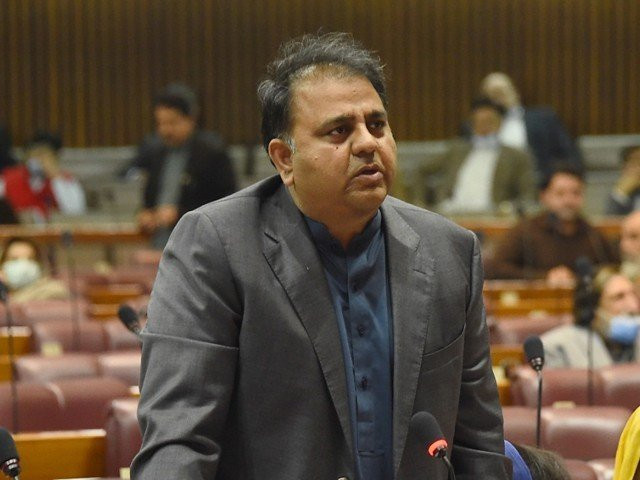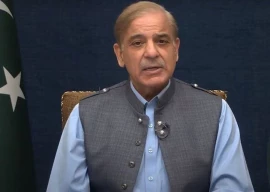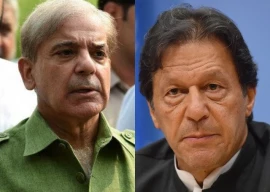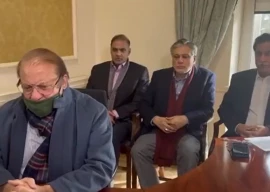
Federal ministers on Sunday maintained that there was an ongoing revolt within the PML-N and the party would split into “more” factions soon.
Federal Information Minister Fawad Chaudhry claimed that the revolt was being led by two PML-N stalwarts, former premier Shahid Khaqan Abbasi and ex-foreign minister Khawaja Asif.
“The PTI is in-touch with five to seven lawmakers of the PML-N,” the minister told The Express Tribune when asked as to how many of the opposition party’s members were ready to part ways with it.
In response to Abbasi’s claim that 22 PTI MNAs were ready to jump ship, the information minister said the PTI believed quite the contrary.
“There is a revolt in the PML-N led by Khawaja Asif, Shahid Khaqan Abbasi and others and soon the party will split into ‘more’ factions.”
Separately, Federal Planning and Development Minister Asad Umar said the opposition parties, instead of making a “futile” attempt to bring a no-confidence motion against the government, should keep an eye on each other because of the “trust deficit” within their ranks.
Addressing a news conference in Punjab’s small town Uch Sharif, the minister said parliament had approved a number of bills introduced by the government despite opposition’s protest. He also referred to the SBP Amendment Bill, which was recently bulldozed in the opposition-dominated Senate.
“The opposition parties should worry about their own members as they are unable to control them,” he added.
Umar said attempts being made by the joint opposition alliance, the Pakistan Democratic Movement (PDM), to de-seat Prime Minister Imran Khan through a no-trust confidence motion in the National Assembly were bound to fail like previous such bids.
Earlier this week, JUI-F chief Maulana Fazlur Rehman, who also heads the PDM, had announced that constituent parties of the alliance had agreed on bringing a no-confidence motion against the "incompetent" government, adding that the allies of the ruling party would also be approached in this connection.
The ministers have frequently been pointing out that two factions – the PML-N and PML-S [Nawaz and Shehbaz] -- already exist and the third was on its way.
Fawad’s recent claim that at least four PML-N leaders went to meet and tell “someone” that they should be considered as their party supremo – former premier Nawaz Sharif – did not suit them has reignited the debate about “more” factions in the party.
The minister’s statement about a revolt within the PML-N has come after Abbasi had claimed that over 22 MNAs belonging to the ruling party were ready to pedal into the folds of the opposition but would not do so as long as the security establishment backed the incumbent government.
Read: Shehbaz woos Chaudhrys for no-trust move
Abbasi had said that “they [the 22 MNAs] do not have specific demands, but they would definitely want a continuation of their politics” -- apparently a hint that they might ask for a PML-N ticket in their respective constituencies in the next general elections.
“As long as the State [security establishment] is with the government, they [PTI lawmakers] are with the government,” he had added.
Sensing the gravity of the statement, Abbasi’s claim quickly elicited a rebuttal from the federal ministers as well as National Assembly Speaker Asad Qaiser, challenging the PML-N leadership to reveal the names of the PTI members allegedly in contact with the opposition.
As expected, the former premier’s claim snowballed into a controversy and is likely to seed grounds for another searing chapter of a political slugfest as the opposition is already engaged in meetings with the coalition partners in efforts to buttress its force against the government.
With the opposition approaching the government’s allies – the PML-Q and MQM-P – and keeping the general-elections season in view, the time for ‘big wickets’ to fall has formally arrived.
The government, which has a simple majority in the National Assembly, has long been surviving with the support of its allies.
However, the opposition parties have recently not only showed unity but started approaching the government’s coalition partners to muster their support for ousting the government.
The opposition has been seeking government allies’ support on grounds that the ruling party was losing the support of the public and “powerful circles” over its poor performance and the allies were equally being blamed for the bad governance. Therefore, they should end the alliance.
With political volatility increasing with each passing day, it would be interesting to see if the opposition bags the government allies’ support when it tables a no-confidence motion. (With input from our correspondent in Lahore)









1726732405-0/Express-Tribune-Web-(15)1726732405-0-270x192.webp)











COMMENTS
Comments are moderated and generally will be posted if they are on-topic and not abusive.
For more information, please see our Comments FAQ